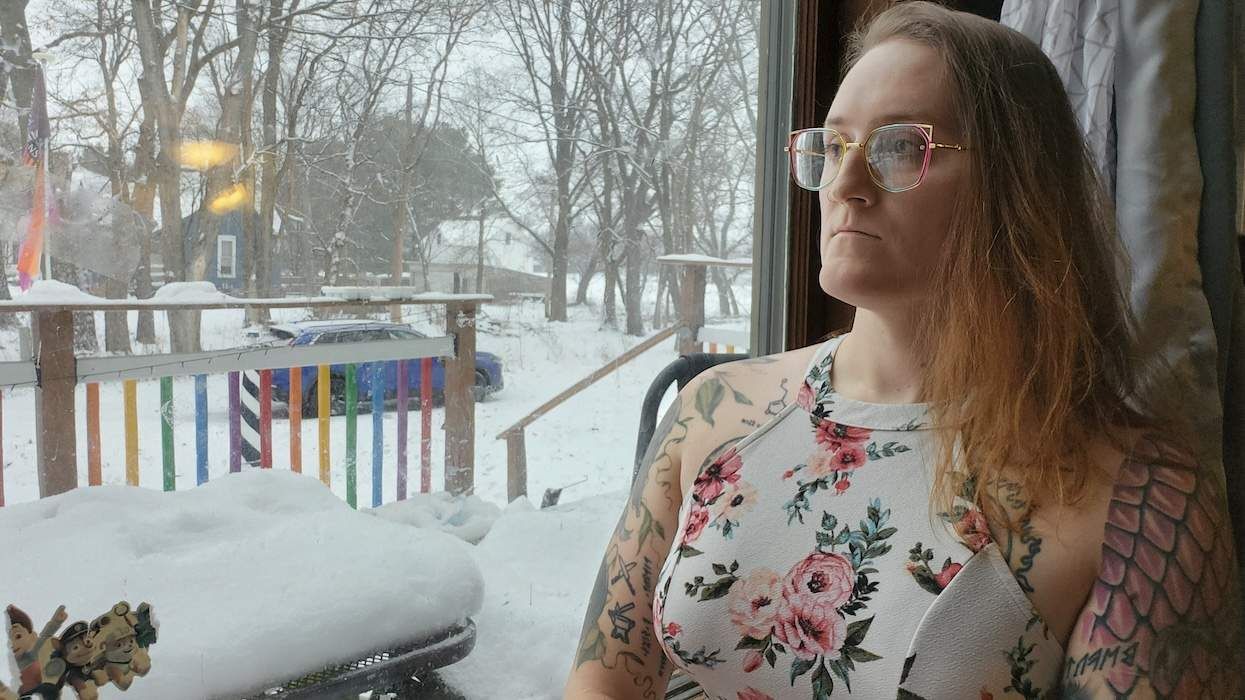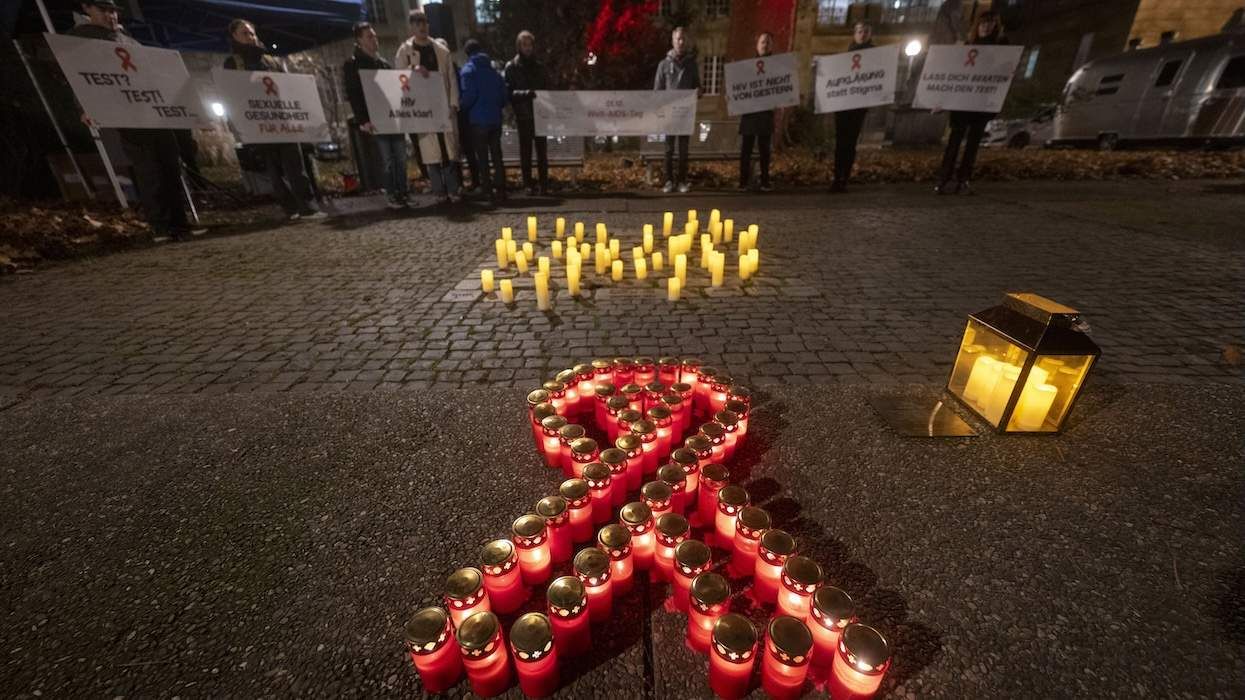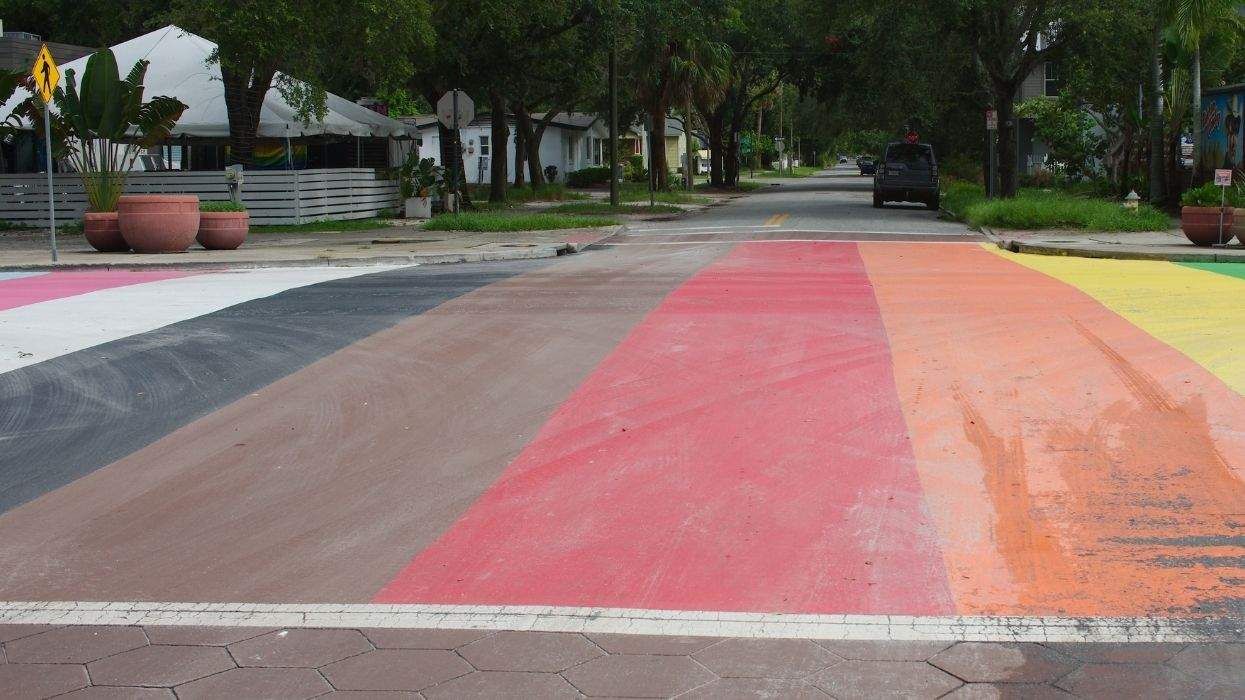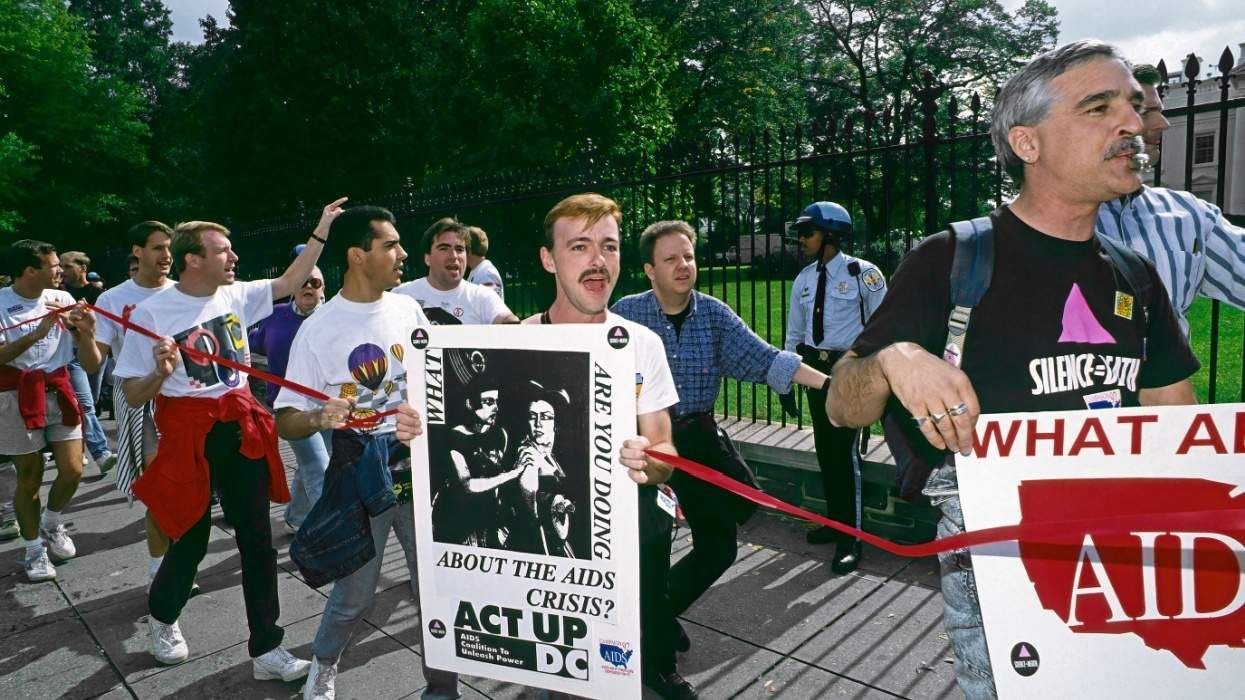CONTACTAbout UsCAREER OPPORTUNITIESADVERTISE WITH USPRIVACY POLICYPRIVACY PREFERENCESTERMS OF USELEGAL NOTICE
© 2025 Equal Entertainment LLC.
All Rights reserved
All Rights reserved
By continuing to use our site, you agree to our Privacy Policy and Terms of Use.
We need your help
Your support makes The Advocate's original LGBTQ+ reporting possible. Become a member today to help us continue this work.
Your support makes The Advocate's original LGBTQ+ reporting possible. Become a member today to help us continue this work.
Spend a few minutes on the phone with Roi Whaley and Aurelio Tolentino, and you assume they've been together a long time, if only because they've perfected a hallmark of many married couples: finishing each other's sentences and correcting one another's anecdotes. The back-and-forth is immediately endearing.
The couple met nearly six years ago in an HIV support chat room. Whaley approached Tolentino -- or was it the other way around? Tolentino says it was. A native of the Philippines who was living in the United States on an employer-sponsored visa, Tolentino worked as a registered nurse in a Long Beach, Calif., hospital. He was also trapped in a physically abusive relationship with a man with whom he shared a small, one-bedroom apartment. After their first online meeting, Tolentino would call Whaley from a local park when he needed someone to talk to.
"I knew there was something special about him, and I knew that I had to help him," says Whaley, a 46-year-old casino supervisor who lives in Gulfport, Miss. "It didn't matter if he fell in love with me. I just wanted to let him know that I would always be there for him ... "
"And he gave me the courage to get out of that relationship and never look back," Tolentino, 39, adds without missing a beat. "There was something about his voice that just told me I could trust him."
Binational gay couples in the United States are no strangers to hardship, but the story of Roi and Aurelio is particularly harrowing, recently catching the attention of Immigration Equality. The national LGBT group is pushing for a last-ditch request for the federal government to reunite the couple, who have been forced to live apart for three years because federal law does not permit gays and lesbians the chance to sponsor their noncitizen partners for residency.
Legislative reform for an estimated 36,000 such couples and their families remains uncertain; it's unclear whether Congress will even take up the issue before the current session adjourns at year end. Meanwhile, Immigration Equality continues to lobby for a bill, known as the Uniting American Families Act, to be included in any comprehensive immigration reform legislation or to be passed as a stand-alone measure.
Whaley and Tolentino were inseparable when they eventually moved in together in 2006 -- Tolentino had learned how to drive, packed his belongings into a Honda Civic, and headed east to Mississippi. At one point the couple shared a 30-foot-long FEMA trailer after Hurricane Katrina destroyed Whaley's apartment. Tolentino found a job at a local hospital while Whaley worked construction jobs (the casino where he was a supervisor had also fallen victim to the hurricane). "We were perfectly happy living in the little trailer," Whaley recalls with a laugh. "It was small, but it was home, and we were together. So it didn't matter where we lived."
Since July 11, 2007, phone calls have been their
primary means of communication, because Tolentino now lives in Vancouver, Canada, after being
ordered to leave the United States. In 2006 his petition for a green card was rejected as a result of his HIV status (the ban on visas for HIV-positive people has since been lifted). A federal judge
in New Orleans denied a subsequent asylum request, ruling that Tolentino had failed to show why he would be in danger if he returned to the Philippines.
At first Whaley would try to travel to
Canada every two or three months to see Tolentino, who lives with his
mother, a legal resident. Then Whaley started getting headaches. His doctors diagnosed him
with toxoplasmosis -- a common opportunistic infection associated with
AIDS -- but a CT scan last year also found that Whaley had a benign tumor
in his brain and a metastasizing tumor in his lung. The cancer was in
stage III and had spread to his pancreas and adrenal glands. Whaley's
low T-cell count made chemotherapy unviable. Though he has a new
oncologist and is good spirits, the prognosis remains grim. "My doctor
tells me I've had several miracles so far, but that I shouldn't expect
it to continue that way," Whaley says.
And yet his main fears
center on Tolentino's well-being. He has also been denied asylum in
Canada and faces a possible removal order back to the Philippines.
Tolentino's sister, who lives in the Philippines, has been harassed
about her brother's HIV status and was told he'd be beaten and
castrated, with his "penis fed to a dog" if he returned there. "He's
going to die there," Whaley says. "He's not going have a job, he's not
going to have access to the medication he needs to live, he's probably
going to be shunned by everyone in his family ... "
"And Roi is
just not going to be able to make that trip in his condition," Tolentino
says. "We're in fear of getting torn apart again, except this time it's
going to be across oceans."
Their story echoes details of another that became a cause celebre last
year. Shirley Tan, a Pacifica, Calif., housewife and mother also from
the Philippines, was arrested by federal immigration
agents during an early morning raid of her family's house. Like Tolentino, she
had been denied asylum and faced the prospect of returning to her
home country (Tan fled to the U.S. in 1989 after a cousin, who was
convicted in the murder of Tan's mother and sister, was released from
prison following a 10-year sentence).
With the support of Tan's congressional representative, Jackie Speier, California senator Dianne Feinstein introduced a private bill
on Tan's behalf, giving her a reprieve from deportation and allowing Tan to stay in the U.S. with her family until next year.
A governmental remedy for Whaley and Tolentino differs from that of Tan and her wife, Jay Mercado, Ralls explains. The two men are requesting that the Department of Homeland Security grant a "humanitarian parole," in which Tolentino would be temporarily allowed back into the U.S. to care for Whaley. In one recent high-profile example, Department of Homeland Security secretary Janet Napolitano granted humanitarian parole to Haitian orphans in need of medical care following the country's devastating earthquake in January.
Humanitarian parole requests are more viable when supported by a congressional representative. In June, Massachusetts senator John Kerry successfully lobbied for a Massachusetts gay couple, Tim Coco and Genesio Oliveira, to be reunited for one year after Oliveira's asylum request was denied, forcing him to return to Brazil. "Here were two people who loved each other and were as committed to each other as you could ever imagine, and a quirk in the law was being allowed to keep them apart. I just wanted to do everything I could to reunite them,'' Kerry said in a statement about the couple.
Whaley's House representative, Gene Taylor of Mississippi, has indicated he may be willing to help, as reported Tuesday by the Dallas Voice. In a Tuesday e-mail to Whaley, Kathy Holland, Taylor's constituent liaison, wrote that the congressman's office has reached out to Obama administration officials and that an immigration liaison is currently researching whether "there [is] anything that could be done to help you and Aurelio." Ethan Rabin, Taylor's press secretary, told The Advocate that his office is considering how it may be able to assist Whaley in his request but declined further comment.
Hopeful for a resolution that could bring them together, Whaley is currently visiting Tolentino in Canada, where the couple wed earlier this year. "We kept postponing this marriage," Whaley says. "But life is short. So we finally decided to go for it. To live in the moment."
From our Sponsors
Most Popular
Bizarre Epstein files reference to Trump, Putin, and oral sex with ‘Bubba’ draws scrutiny in Congress
November 14 2025 4:08 PM
True
Jeffrey Epstein’s brother says the ‘Bubba’ mentioned in Trump oral sex email is not Bill Clinton
November 16 2025 9:15 AM
True
Watch Now: Pride Today
Latest Stories
Queer comedian Cameron Esposito has first baby with wife Katy Nishimoto
December 02 2025 12:49 PM
Trans National Guard employee in Illinois sues Trump over restroom ban
December 02 2025 11:59 AM
Oklahoma University instructor suspended for failing student’s unscientific anti-trans psychology essay
December 02 2025 11:03 AM
Here are all of Trump's political enemies that have been charged or investigated (so far)
December 02 2025 9:52 AM
Joe Biden to receive top honor at LGBTQ+ leadership conference for his contributions to equality
December 02 2025 6:00 AM
On World AIDS Day, thinking of progress and how to build on it in the face of hostility
December 01 2025 7:47 PM
Ex-Biden White House aide called out for implying Cory Booker’s new marriage is suspicious
December 01 2025 6:04 PM
True
HIV-positive men stage 'Kiss-In' protest at U.S.-Mexico border (in photos)
December 01 2025 12:56 PM
Maryland community outraged after ‘bigoted’ early morning rainbow crosswalk removal
December 01 2025 11:07 AM
19 LGBTQ+ movies & TV shows coming in December 2025 & where to watch them
December 01 2025 9:00 AM
Trending stories
Recommended Stories for You





































































Charlie Kirk DID say stoning gay people was the 'perfect law' — and these other heinous quotes